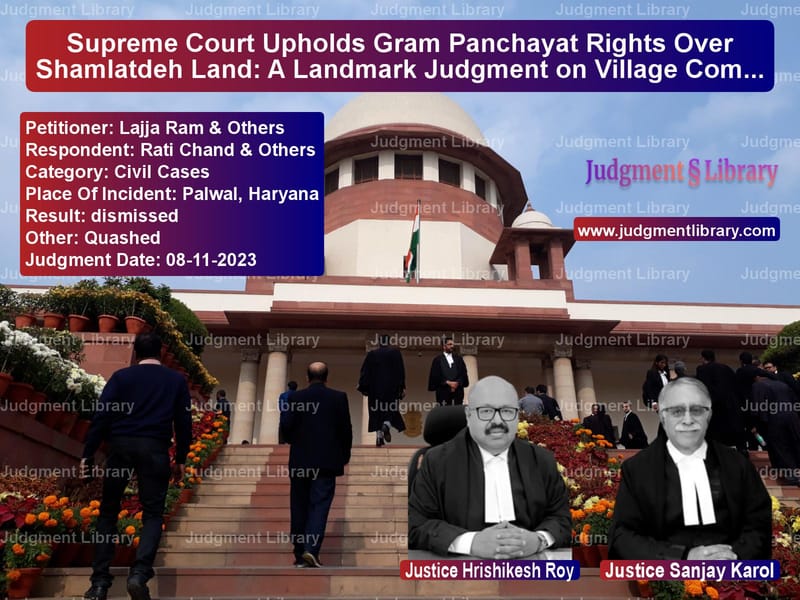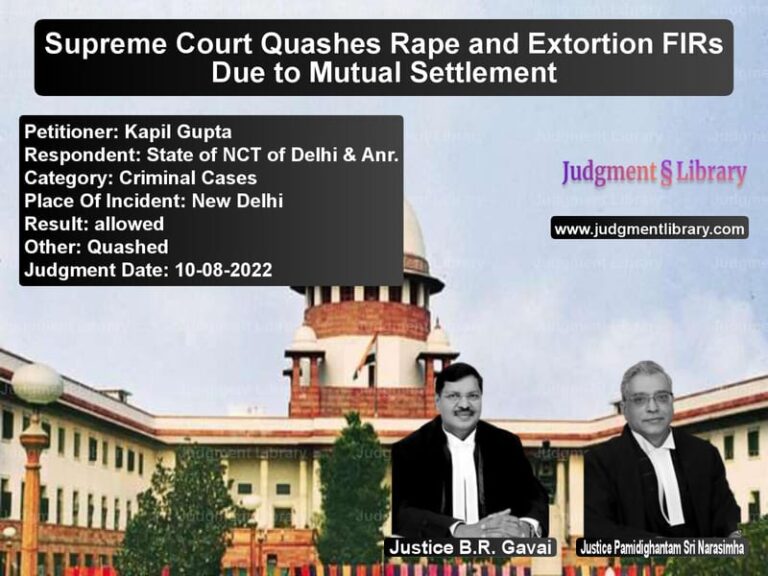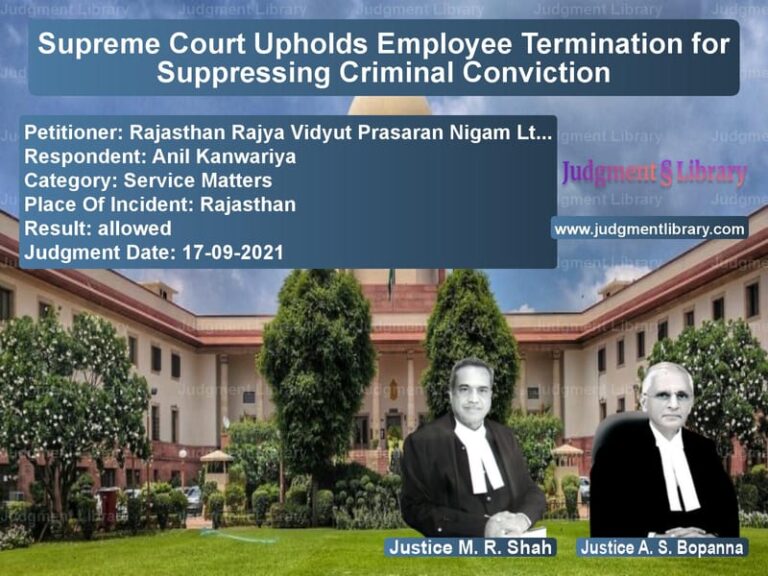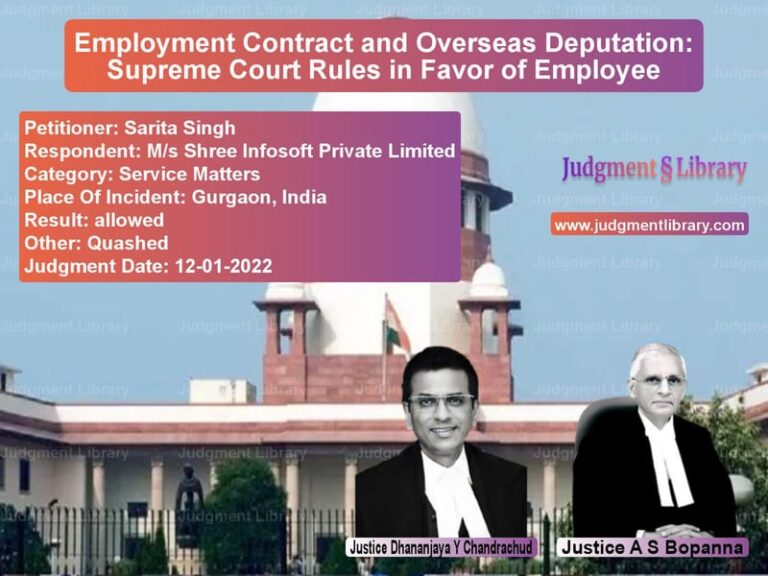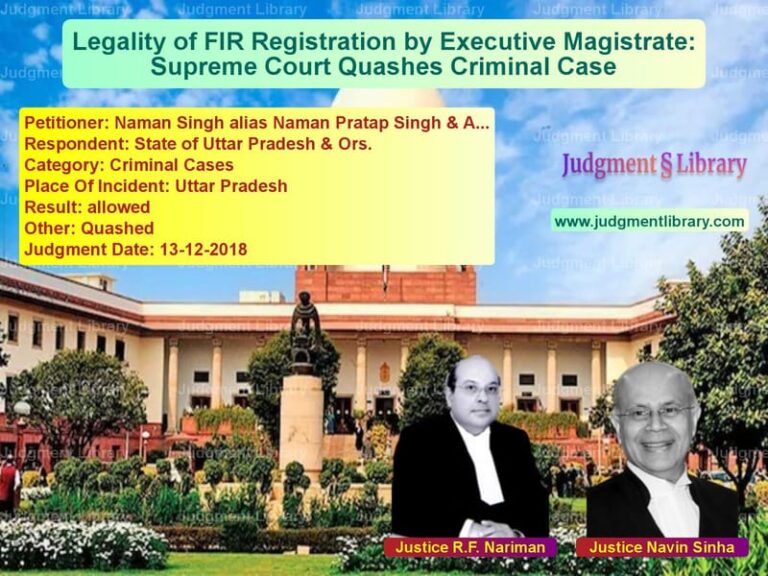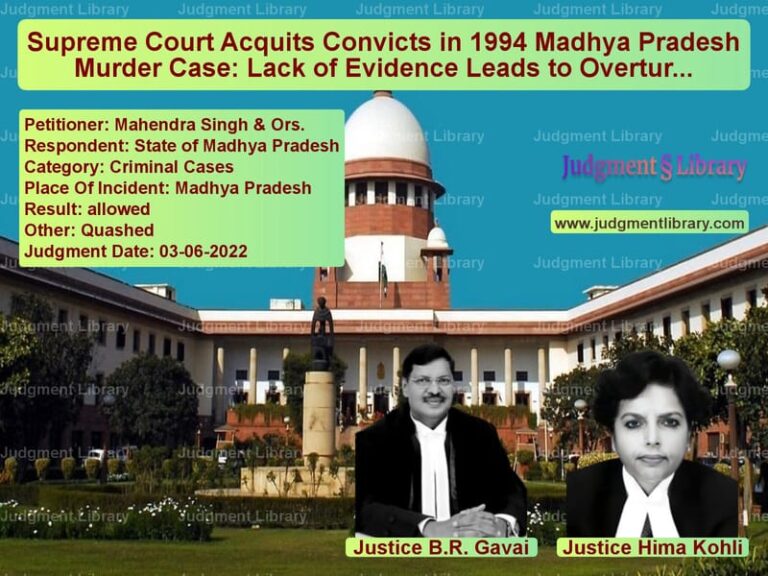Supreme Court Upholds Gram Panchayat Rights Over Shamlatdeh Land: A Landmark Judgment on Village Commons
The Supreme Court of India recently delivered a significant ruling in Lajja Ram & Others v. Rati Chand & Others, reaffirming the legal principle that shamlatdeh land—village commons—cannot be transferred as private property. This case revolves around the unauthorized sale of such land by a bhondedar (a landholder with limited possessory rights), reinforcing the rights of the Gram Panchayat over communal resources.
Background of the Case
The dispute originated in Palwal, Haryana, where Narain Dass, a bhondedar, executed multiple sale deeds in 1987 and 1988 in favor of Lajja Ram & Others. The plaintiffs—village proprietors—challenged these transactions, asserting that the land was meant for community use and not for private sale.
The trial court initially ruled in favor of the defendants, validating the sale deeds. However, the Additional District Judge and the Punjab & Haryana High Court later overturned this decision, emphasizing that shamlatdeh land is not alienable under the law. The matter then reached the Supreme Court.
Key Legal Issues
- Did the bhondedar have ownership rights over shamlatdeh land?
- Were the sale deeds legally valid?
- Did the village proprietors and the Gram Panchayat have superior rights over the land?
- Was the suit challenging the sale deeds time-barred?
Arguments by the Appellants (Lajja Ram & Others)
The appellants contended:
- Narain Dass had occupancy rights under the Punjab Tenancy Act, 1887.
- His tenancy rights were heritable and transferrable.
- The trial court was correct in holding that he had continued performing services for the temple and the village, justifying his retention of the land.
- The challenge to the sale was time-barred, as it was brought years after the sale deeds were executed.
Arguments by the Respondents (Village Proprietors & Gram Panchayat)
The respondents argued:
- Narain Dass was only a bhondedar, granted land in return for services to the village.
- His rights were non-heritable and non-transferrable, meaning any sale he conducted was illegal.
- The land in question was meant for community use, and its alienation was contrary to the law.
- The villagers became aware of the sale only later, so the limitation period should start from the date of knowledge, not the sale date.
Supreme Court’s Analysis
1. Nature of Bhondedar Rights
The Court examined the concept of bhondedar, a tenure system where an individual is granted land rent-free in exchange for services. The Court clarified:
“A bhondedar is granted a parcel of land rent-free within a village by the biswedars (proprietors), in lieu of payment for services rendered. He can be ejected if he fails to fulfill the conditions of such a grant.”
The Supreme Court held that such tenure does not confer ownership and any transfer by the bhondedar was null and void.
2. Invalidity of the Sale
The Court ruled that Narain Dass had no right to transfer the land:
“A bhondedar had only limited possessory rights and did not hold ownership. Any alienation of shamlatdeh land by him was manifestly void.”
The Court reiterated that shamlatdeh land is governed by village customs and statutory protections, preventing its sale.
3. Reversion of Land to Village
The Court determined that once Narain Dass ceased rendering services, his right to hold the land expired:
“The land should have returned to the common village pool as soon as the bhondedar ceased rendering services.”
This reaffirmed the collective ownership of shamlatdeh land, reinforcing Gram Panchayat control.
4. Time-Barred Suit Argument Rejected
The appellants claimed that the challenge was time-barred. The Supreme Court rejected this argument, stating:
“The limitation period for challenging the sale did not commence from the date of sale deeds but from the date of knowledge of the sales by the village proprietors.”
This ruling emphasizes that in cases involving village land, limitation laws must be interpreted in favor of the community.
5. Importance of Gram Panchayat in Land Administration
The judgment reinforced the role of the Gram Panchayat in managing village commons. The Court noted:
“Shamlatdeh land is meant for the collective benefit of the village and cannot be privatized. The Gram Panchayat has a duty to ensure its proper management.”
This aligns with the principle that village commons must remain under local governance to prevent encroachment.
Final Judgment
The Supreme Court:
- Dismissed the appeal of Lajja Ram & Others.
- Declared that the sale deeds were void and the land should be restored to the village.
- Held that bhondedar rights are non-transferrable, reinforcing Gram Panchayat control over shamlatdeh land.
Conclusion
This ruling has far-reaching implications for rural land governance, ensuring that:
- Shamlatdeh land remains a communal resource.
- Bhondedar rights are strictly limited to possessory use, not ownership.
- Gram Panchayats are empowered to challenge illegal transfers.
The judgment sets a strong precedent against unauthorized land alienation and reaffirms the legal principle that village resources cannot be converted into private property.
Petitioner Name: Lajja Ram & Others.Respondent Name: Rati Chand & Others.Judgment By: Justice Hrishikesh Roy, Justice Sanjay Karol.Place Of Incident: Palwal, Haryana.Judgment Date: 08-11-2023.
Don’t miss out on the full details! Download the complete judgment in PDF format below and gain valuable insights instantly!
Download Judgment: lajja-ram-&-others-vs-rati-chand-&-others-supreme-court-of-india-judgment-dated-08-11-2023.pdf
Directly Download Judgment: Directly download this Judgment
See all petitions in Property Disputes
See all petitions in Landlord-Tenant Disputes
See all petitions in Damages and Compensation
See all petitions in Specific Performance
See all petitions in Contract Disputes
See all petitions in Judgment by Hrishikesh Roy
See all petitions in Judgment by Sanjay Karol
See all petitions in dismissed
See all petitions in Quashed
See all petitions in supreme court of India judgments November 2023
See all petitions in 2023 judgments
See all posts in Civil Cases Category
See all allowed petitions in Civil Cases Category
See all Dismissed petitions in Civil Cases Category
See all partially allowed petitions in Civil Cases Category

